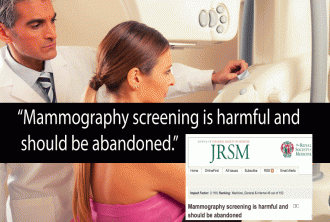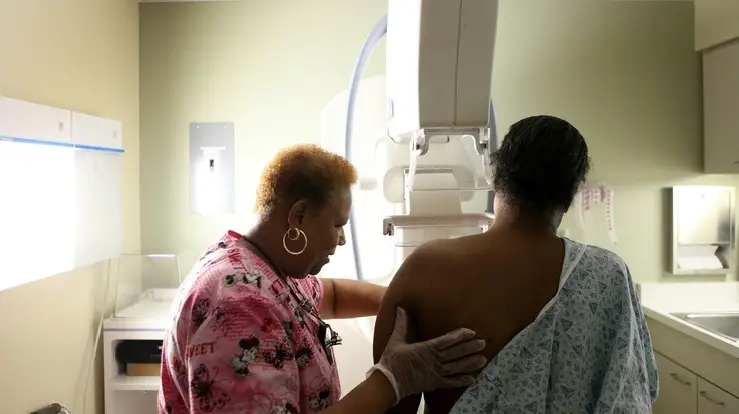7th October 2015
By Sayer Ji
Contributing Writer for Wake Up World
“I believe that if screening had been a drug, it would have been withdrawn from the market long ago.” ~ Peter C Gøtzsche (physician, medical researcher and author of Mammography Screening: Truth, Lies and Controversy.)
With Breast Cancer Awareness Month upon us again, a new study promises to undermine the multi-billion dollar cause-marketing campaign that shepherds millions of women in to have their breasts scanned for cancer with x-rays that themselves are known to contribute to breast cancer.
If you have followed my work for any length of time, you know that I have often reported on the adverse effects of mammography, of which there are many. From the radiobiological and psychological risks of the procedure itself, to the tremendous harms of overdiagnosis and overtreatment, it is becoming clearer every day that those who subject themselves to screening as a “preventive measure” are actually putting themselves directly into harms way, unnecessarily.
Now, a new study conducted by Peter C Gøtzsche, of the Nordic Cochrane Centre, published in the Journal of the Royal Society of Medicine and titled “Mammography screening is harmful and should be abandoned,” strikes to the heart of the matter by showing the actual effect of decades of screening has not been to reduce breast cancer specific mortality, despite the generation of millions of new so-called “early stage” or “stage zero” breast cancer diagnoses.
Previous investigation on the subject by Gotzsche resulted in the discovery that over-diagnosis occurs in a staggering 52% of patients offered organized mammography screening, which equates to “one in three breast cancers being over-diagnosed.” The problem with over-diagnosis is that it almost always goes unrecognized. This then results in over-treatment with aggressive interventions such as lumpectomy, mastectomy, chemotherapy and radiation; over-treatment is a euphemistic term that describes being severely harmed and/or having one’s life shortened by unnecessary medical treatment. Some of these treatments, such as chemotherapy and radiation, can actually enrich cancer stem cells within tumors, essentially altering cells from benign to malignant, or transforming already cancerous cells into far deadlier phenotypes.
Other recent research has determined that the past 30 years of breast cancer screening has lead to the over-diagnosis and over-treatment of about 1.3 million U.S. women, i.e. tumors were detected on screening that would never have led to clinical symptoms, and should never have been termed “cancers” in the first place. Truth be told, the physical and psycho-physical suffering wrought by the harms of breast cancer screening can not even begin to be quantified.
Gøtzsche is very clear about the implications of his review on the decision to undergo mammography. He opines that the effect of screening on mortality, which is the only true measure of whether a medical intervention is worth undertaking, is to increase total mortality.
Gøtzsche summarizes his findings powerfully:
“Mammography screening has been promoted to the public with three simple promises that all appear to be wrong: It saves lives and breasts by catching the cancers early. Screening does not seem to make the women live longer; it increases mastectomies; and cancers are not caught early, they are caught very late. They are also caught in too great numbers. There is so much overdiagnosis that the best thing a women can do to lower her risk of becoming a breast cancer patient is to avoid going to screening, which will lower her risk by one-third. We have written an information leaflet that exists in 16 languages on cochrane.dk, which we hope will make it easier for a woman to make an informed decision about whether or not to go to screening.
“I believe that if screening had been a drug, it would have been withdrawn from the market long ago. Many drugs are withdrawn although they benefit many patients, when serious harms are reported in rather few patients. The situation with mammography screening is the opposite: Very few, if any, will benefit, whereas many will be harmed. I therefore believe it is appropriate that a nationally appointed body in Switzerland has now recommended that mammography screening should be stopped because it is harmful.”
In the midst of Breast Cancer Awareness Month, a cause marketing orgy bedecked with pink ribbons, and infused with a pinkwashed mentality that has entirely removed the word “carcinogen” (i.e. the cause of cancer) from the discussion. All the better to raise billions more to find the “cure” everyone is told does not yet exist.
Women need to break free from the medical industrial complex’s ironclad hold on their bodies and minds, and take back control of their health through self-education and self-empowerment. The following articles and resources should help aid in that goal:
Related reading:
- How X-Ray Mammography Is Accelerating The Epidemic of Cancer
- Study: Many Breast Tumors Will Spontaneously Regress
- Hidden Dangers of Mammograms Every Woman Should Know About
- Confirmed: The More Mammograms You Get, The More Harm They Do
- Cancer Screening Doesn’t Save Lives, Meta-Study Reveals
- Sunlight Holds Key To Killing Breast Cancer
- Study: 80% of Early-Stage Breast Cancers DO NOT Progress to More Concerning Forms
- FAIL: Another Mammography Study Finds They Don’t Save Lives
- Dressed To Kill: The Link Between Breast Cancer and Bras
- Millions Wrongly Treated for ‘Cancer,’ National Cancer Institute Panel Confirms
- 30 Years of Breast Screening: 1.3 Million Wrongly Treated
- A Pink Wolf In Sheep’s Clothing – Strange Bedfellows “Curing” Cancer
Previous articles by Sayer Ji:
- Cinnamon May Be Superior to Ibuprofen for Menstrual Pain, Study Reveals
- Gingko Biloba: Boost Memory, Regenerate Neurons with This Ancient Plant
- Is the Cure for Diabetes a Humble Root?
- Ibuprofen Kills Thousands Each Year, So What Is The Alternative?
- Coconut Water: A New Alzheimer’s Disease Treatment?
- Turmeric’s ‘Smart Kill’ Properties Put Chemo & Radiation To Shame
- 6 Evidence-Based Ways Drumming Heals Body, Mind and Soul
- Research: Plants Cure Cancer, Not Chemicals
- Beet Juice Boosts Cognitive Function In One Dose
- 13 Evidence-Based Medicinal Properties of Coconut Oil
About the author:
 Sayer Ji is founder of Greenmedinfo.com, on the Board of Governors for the National Health Federation, and Fearless Parent, Steering Committee Member of the Global GMO Free Coalition (GGFC), a reviewer at the International Journal of Human Nutrition and Functional Medicine.
Sayer Ji is founder of Greenmedinfo.com, on the Board of Governors for the National Health Federation, and Fearless Parent, Steering Committee Member of the Global GMO Free Coalition (GGFC), a reviewer at the International Journal of Human Nutrition and Functional Medicine.
Visit GreenMedInfo online and on Facebook, or sign up for GreenMedInfo’s e-Newsletter.

If you've found value in our articles, we invite you to support the release of our brand-new book, "Gratitude Practices for Kids: A Practical Guide for Adults to Instill a Spirit of Appreciation and Positivity in the Next Generation."
"Gratitude Practices for Kids" brings together over 25 innovative and accessible practices designed to enhance gratitude in everyday life. This comprehensive guide is backed by 17 scientific studies, ensuring each concept is grounded in research, underscoring our commitment to nurturing growth, emotional intelligence, and positive interactions between adults and children.
We encourage you to opt for the paperback version to celebrate this new release. Dive into its fresh pages away from digital distractions, allowing you to immerse yourself in the transformative practices it offers.
Over recent years, Wake Up World has faced significant online censorship, which has impacted our financial ability to operate. Moving into book publishing represents a strategic step to secure the ongoing funds needed to continue our mission. By purchasing Gratitude for Kids, you help us keep our content free and accessible to everyone, avoiding needing a paywall. With over 8,500 articles published in the last 13 years, we remain dedicated to keeping our valuable content open to all.









